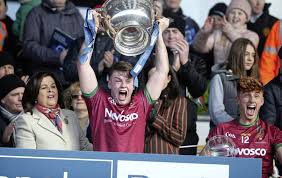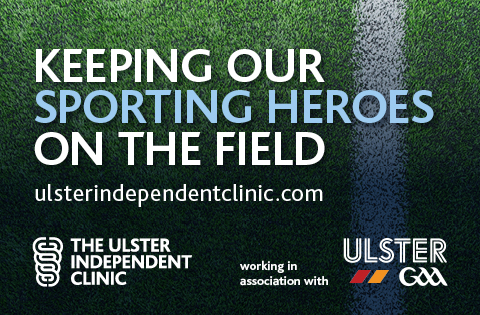St. Ronan’s Historic Hogan Win
TWO years ago St Ronan’s Lurgan, less that three years up and running as a school, won their maiden MacRory title and went on to cap a marvellous season by lifting the Hogan Cup.
This week in conversation with Séamas McAleenan he reflected on the early years of the new school and how success came so quickly.
SMcA : Tell us a little about where the new St Ronan’s College came from in 2015.
DW : Well educationally this area was slightly different from the rest of the north. The Dickson Plan had set up Junior High schools (St Mary’s for the girls and St Paul’s for the boys) with those more academically minded moving to St Michael’s Grammar school at the start of their GCSE courses. St Michael’s didn’t have Years 8-10 at all.
Those that remained in St Mary’s and St Paul’s could also take GCSE or Vocational subjects or a combination of both. After GCSE some of those students opted to come to St Michael’s for A Level, others went to the local Colleges of Further Education or left education for work or whatever.
The amalgamation was all about bringing everyone together under the one roof.
So really the new St Ronan’s did not produce an increase in numbers in each year group.
Since 2015 we have, in line with many other school, brought in a wider range of Post 16 subjects and you would see a slight increase in the numbers remaining in education with us.
SMcA: So, essentially the amalgamation didn’t result in more players suddenly becoming available to your teams?
DW : No. The only change was in Years 11 and 12. The juniors would all have been together in Years 8 to 10 in St Paul’s winning Vocational titles with Mickey (Donnelly) and before that Jimmy Smyth. We would have got most of those coming into St Michael’s then as Fourth Years, while some remained with St Paul’s. Now they were all together in St Ronan’s.
Having them altogether in their GCSE years means that they can see a path through to Sixth Form in the school. But the numbers for Sixth Form would have been roughly similar before and after the amalgamation.
SMcA: How then did this Hogan Cup winning team evolve?
DW: Well even before they came to us, they would have won Vocational schools’ competitions with Micky (Donnelly) in St Paul’s.
In that first year of the new school, the Fifth Years won a Danske Bank Rafferty Cup and later on the Fourth Years won the Treanor Cup. Those are the B competitions for their year groups and that was a stepping stone.
Then the Year 12s moved up and reached the Rannafast semi-final where they lost narrowly to St Macartan’s. A number would also have gone into the MacRory panel as a result of that campaign.
In years gone by, St Michael’s would have moved between MacLarnon and MacRory. But that was always a struggle with the boys. If you talked about the MacRory, you had to convince them that they could compete at the higher level and that they would get more out of it.
There was that mindset that had to be changed. And of course if the pre-Christmas games didn’t go all that well, you had a real struggle on your hands.
That 2015-16 year wasn’t much different initially even though we had good players. It didn’t go well before Christmas but we played and beat St Macartan’s (Monaghan) in the MacRory play-off and then we beat St Colman’s Newry in the quarter-final.
That result was a turning point. There would have been a lot of boys down the years from around Lurgan who enjoyed MacRory and Hogan success with St Colman’s and the school would have been up there on a pedestal. Beating them helped change the mindset in St Ronan’s even though we subsequently lost the semi-final to St Paul’s.
SMcA : You also reached the semi-final the following season, 2016-2017.
DW : Yes we did. But more importantly for us we won the MacCormack Cup, which is for the pre-Christmas league. You have to top your qualification group and then there is a semi-final and final. We beat Omagh CBS in that final in Queen’s.
Between prior to the St Colman’s game in February 2016 and now the MacCormack win in December, there was a definite shift. Now the boys saw themselves as genuine MacRory contenders and they trained to achieve that.
We met and beat Patrician Carrickmacross in the quarter-final and then we had St Colman’s in the semi-final. They beat us. I think having lost the year before they went into the game with the attitude that it wasn’t going to happen two years in a row and they got their revenge.
SMcA : Tell me a bit about the management team you had and still have.
DW : Back when the school was just St Michael’s you would have had Seamus Heffron and me taking all the teams. Then you had new teachers coming in to take teams and, with the amalgamation, we have a much bigger pool of teachers prepared to put the work in.
Since 2015 you have a couple of teachers taking a team at a certain age-group and able to focus on that team only. In terms of progressing football in the school that is very important and you don’t get teachers burning themselves out because they are trying to cover too many bases all at once.
And those teachers are putting a huge effort in. I am thinking of Paddy Davey, Phillip McKenna, Martin McMahon, Tony Keegan, Joe Herron, Conor Scullion, Brian Taggart and Caroline McGrath the Head of PE.
Caroline also made a huge contribution to the MacRory team. The three of us, myself, Mickey (Donnelly) and Colm Fegan, I suppose are the public face of the MacRory management. Caroline is also a trained physio and she was a huge part of our success.
And the school community has really come behind us as well. There is huge interest in the team now and that has a pay off for the school as a whole.
Novosco has been our sponsor for a few years now and Patrick McAliskey was a lot more than a sponsor. He played a big role in preparing the team. Patrick brought a business perspective to the preparations.
He brought in motivational speakers that helped a lot with mental preparation. You can look back on a few of those talks and say they really helped – even at the time, you were coming out of the talk and thinking that was really good.
For the final, he had a letter from Martin O’Neill sitting on their kit after they walked around Croke Park pre-match.
I would also say that the Armagh county coaches had a big impact as well. From 2014 through to 2018, Armagh joined up the schools and Development Squads for Strength and Conditioning work and that really helped our teams.
SMcA : Your campaign in 2017-18 followed a path similar to the previous year, didn’t it?
DW: You mean in terms of winning the MacCormack Cup again? Yes, pre-Christmas went well and we went through to the semi-finals of the MacCormack and then beat Maghera in the final at MUSA just before Christmas.
Maghera are always a good team and that year they were well-fancied. Beating them in the MacCormack final was another big step for us.
It was around then that we became more aware of the fact that only on a couple of occasions had the winners of the MacCormack actually gone on to win the MacRory. We hadn’t added the MacRory the previous year.
Now I know that neither game should impact on the other. But at the back of your mind, that thought can gather pace.
SMcA: Getting through to the MacCormack final means that you get a bye into the MacRory quarter-finals.
DW: That is correct and we met Patrician Carrickmacross down in Castleblayney on a really cold wintry night. I have to say that I was very nervous travelling down to play them that night.
While the other teams played a first round game, we played a couple of challenge games and we were happy enough with how those went. But a knock-out game is another level.
Patrician were not a bad side. They had won the Rannafast a couple of years earlier and that was a real test for us. We went 0-13 to 0-7 up in the third quarter and only added a point from a free from Eoin McConville in the last quarter.
We edged the game 0-14 to 1-10 and I have never spoken in a dressing room more devastated than the Patrtician one that night. We saw it completely different though; we had gone down to a Monaghan venue and beaten a Monaghan team in challenging conditions without playing particularly well.
Our performance in the semi-final in the Athletic Grounds against St Patrick’s Armagh was also patchy and we needed an injury time goal from Eoin (McConville) to get through. But some of our players were in their third semi-final in a row. There was that determination there.
SMcA: Then you had the reigning champions St Mary’s Magherafelt in the final.
DW : The second semi-final was in Bellaghy later that weekend and we went up to watch. There was some atmosphere at it. Maghera were favourites, Magherafelt were champions. And a huge crowd came out.
But St Mary’s turned them over with six goals. So that certainly put us and the team on our toes. There was not going to be any complacency ahead of the final.
It was a windy St Patrick’s Day in the Athletic Grounds and I have played there on windy days. Some way or other it is very difficult to score there on a windy day.
We got a dream start. A penalty goal from Oisin Smyth and we added a point. But St Mary’s got back in with a goal and went ahead.
Rioghan Meehan scored three points in the second half and Mark McAfee came off the bench to get another. Those were big scores in a low-scoring game and we won 1-9 to 1-7.
SMcA : You are now first time winners of the MacRory. How do you bring the team down from that high to prepare for a Hogan semi-final?
DW: There was that ambition in the players. They wanted more. We had played teams from Leinster and Connacht and knew we were close to the All-Ireland level. I suppose there also was that sense that we had won those three MacRory knock-out games without playing well.
Our big performance came out in the Hogan semi against Pobalscoil Chorca Dhuibhne. They had won two Hogans in a row in 2014 and 2015 with the Kerry manager Eamon Fitzmaurice as manager. St Brendan’s Killarney with David Clifford had won the next two. So Kerry was going for five in a row.
That was our best performance of the season. We went five clear after 15 minutes, but we had a wobble before half-time and the game might have got away from us. They got right back into the game, went a point ahead, hit the crossbar and we just needed the half-time break to re-group.
In the second half we recovered and pulled away. Ruairí McConville scored three points and Josh Megoran’s goal sealed it.
Rice College from Westport won the other semi-final. So both teams were chasing a win.
It was a really tough game in the final. We conceded a soft goal; a 45 went all the way to our net. But Tiarnán Kelly got our goal and then there was that brilliant winning point from Oisín Smyth under the Hogan Stand.
SMcA: You have mentioned quite a few players who produced key late scores for you. Can you tell us who were the leaders, who were the characters in the team?
DW : There were so many leaders in the team. They all had a lot of ability and, as you say, different players could produce match-winning moments.
Jamie Hughey was the captain. He didn’t train between the MacRory semi and final because he went over on his ankle. A great leader.
Jack Lenehan at midfield was the same, very mature. Look, I would say they were very close as a group and that bond was one of their biggest strengths.
Characters. There probably was none to outdo Mickey (Donnelly, the co-manager). Mickey could get the work done and still wind boys up about anything – their tans from sunbeds, their girl-friends. A great person to have around any team.
SMcA : These boys are still only 20 years of age. Who will we hear a lot more about in the coming years?
DW : Well Adam Loughran is already making the Antrim team. He is down at UCD and progressing well there too.
Then there is Tiarnán Kelly knocking about the Armagh panel at the minute. He is in the Queen’s team too.
Plenty of them could make it at county level, it might depend on the immediate competition they face to get into the team, whether or not they have the patience. I am thinking of Jack Lenehan, Rioghan Meehan, Luke Mulholland the goalie.
Look, it will come down to ambition as much as ability. They all have the ability and we saw that collective ambition producing the goods two years ago. However plenty of boys around 20 lose that ambition, that drive.







